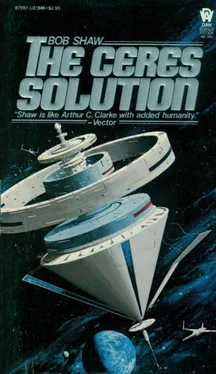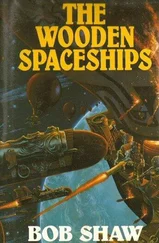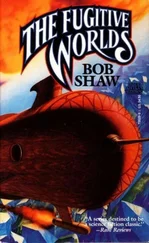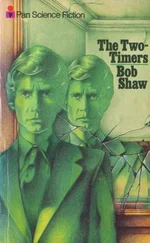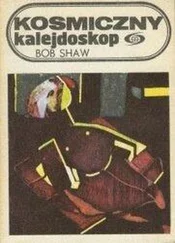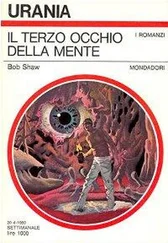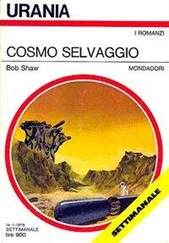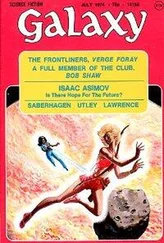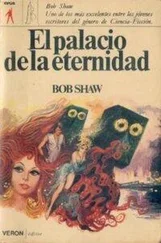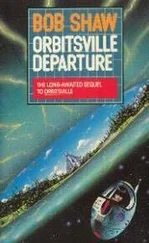The chair rocked wildly as it struck clumps of yellow moss, a reminder that it was completely unsuited for rough ground. Hargate narrowed his eyes against the encroaching light as he passed through the gap. The light blazing from the amber forest was so intense that it seemed to constitute a physical barrier to his progress, but some distance to his left he saw the beginnings of a path through the trees. He made a sharp turn by momentarily stopping his left-hand wheel, then accelerated towards the track, cursing the machine’s sluggishness as he went. Its batteries, already drained by the difficult approach to Cotter’s Edge, were too weak for speeding.
He had almost reached the path when Vekrynn, still moving without haste, stepped out of a ruined doorway in front of him and stood with his arms spread wide in a nimbus of reflected light. Hargate braked violently and, realising the futility of trying to flee, brought his chair to a halt a few paces away from the Mollanian. There was a moment of throbbing silence.
“There is no need for you to be alarmed,” Vekrynn said, speaking very slowly and distinctly. “I have made provision for you.”
Hargate produced a sneer. “I’ll bet you have.”
Vekrynn paused, his eyes fixed on a point above Hargate’s head. “I want you to come with me.”
“And I,” Hargate replied, “want you to piss off.”
The silence descended again while Vekrynn considered the remark. “It is natural for you to be frightened and confused,” he said, still speaking with exaggerated care, “but I can assure you that…”
“I’m not frightened, and I’m not confused, and I’m not a moron—so you can take the marbles out of your mouth.” Having begun a verbal offensive, Hargate decided to follow through. “And I demand to be taken back to Earth.”
“Earth? Very well—if that’s what you want.”
“That’s what I want.”
“As you wish,” Vekrynn said. “All you have to do is return with me to the centre of the plaza. I can’t explain it to you, but it is important that you position yourself exactly at the…”
“Hold on,” Hargate said quickly. “Gretana said you wouldn’t let me go home. She said you were taking me to some place called Cialth.”
Vekrynn’s face was almost hidden in webs of light rays. “You can be properly looked after on Cialth—as some compensation for the way we have infringed your rights as an individual. However, if you prefer to go back to Earth I have no objections.”
“But…” Hargate’s suspicion that he was being manipulated grew stronger. “What if I blab everything I know?”
Vekrynn chuckled. “Who would believe you? Besides, you would be arriving at a very isolated spot at the beginning of a winter night. It is likely that within a very short time you would be…” The Mollanian transferred his gaze to another point in the distance. “In all probability you would…”
“Die is the word you’re looking for,” Hargate said, feeling a secondary stirring of intuition. According to the fantastic scenario Gretana had unfolded earlier, the luminant giant standing before him had been alive for something like fifty centuries—approaching the limit for a Mollanian. Even for the Warden of Earth there eventually had to be an ending. How would such a being regard the imminence of death? It was difficult enough for Terrans, the unwitting mayflies of the interstellar community, to come to terms with personal extinction—so how would a man like Vekrynn feel as he neared the end of his lifespan? Sated? Philosophically resigned? Perhaps that would be true for some Mollanians, but Hargate had a sudden conviction that Vekrynn felt otherwise…
“I’m neglecting important duties,” Vekrynn said, his voice growing louder. “You must go back to the centre of the plaza immediately.”
Hargate looked up at him, squinting into the light. “What if I decide to stay right here?”
“Again, the choice is entirely yours. This is an uninhabited world, with no food or water, but if it suits you to remain here…” Vekrynn turned to walk away.
“Wait!” Hargate reviewed the few options that were open to him, and reluctantly reached for his drive control. His belief that the Warden wished him dead had not altered, but on the other hand Gretana had told him the Mollanian reverence for life was so great that homicide was virtually unknown among her people. He would, regardless of how apprehensive he felt, have to trust Vekrynn would stop short of murder when it came to tidying up his affairs.
“I’ve thought things over,” Hargate said. “Earth has nothing for me—so I’ll go to Cialth.”
“A wise decision.” Vekrynn indicated the doorway from which he had emerged. “This is too narrow for you. We’ll go back through the gap in the wall.”
“Right.” Hargate looked ruefully at the forest of translucent tamber trees, wishing there had been a chance to examine them properly, then it came to him that he had become remarkably blase in a very short time. He had decided to abandon his home planet for ever, was now about to flit instantaneously to yet another remote and unknown world, and could feel almost no emotional reaction. So much had happened during the day that his mind was overloaded, his capacity for surprise diminished. What he needed now was time to rest and reflect, to process the information, and yet one personal truth was already emerging from the blur that was his consciousness. He wanted to be with Gretana again. Looking at the flawless, changeless beauty was like an excursion into the past, a return to the bright land of illusion, magic and hope.
“After I get to Cialth,” he said, turning the chair, “will I be able to see Gretana?”
“It should be possible—though not often.”
The noncommittal answer reassured Hargate he was not being lured or tricked by Vekrynn into travelling with him to, say, a detention centre or worse, but it was too vague to be satisfactory. “How often?”
“As often as she wishes.”
“Do you practise being evasive?” Hargate began to drive forward. “Or is it a natural gift?”
Vekrynn, still averting his gaze, fell into step beside the slow-moving chair. “I have nothing to say to you.”
“Why? What are you afraid of?”
“Afraid!” Vekrynn glanced down at Hargate, his face registering scorn as they moved on to the reddish tesserae of the circular plaza. “I can’t think of a less apposite word.”
This is incredible , Hargate thought. This man is supposed to be a diplomat who has had thousands of years to practise verbal fencing—and yet I can rattle him every time .
The only explanation suggesting itself was that his presence was placing the Mollanian under near-intolerable stress. It was possible that a member of a disease-free race, one in which physical perfection was the norm, could suffer when confronted by crippling illness—but was there more to it with Vekrynn? Was the fear of death that Hargate had sensed in him earlier so great? Could it be that Hargate, whose life expectancy could conveniently be measured in months, was a reminder to Vekrynn that he too was mortal and that the message was one the big man could not bear to contemplate? Trying to comprehend Vekrynn’s viewpoint, Hargate looked up at the resplendent figure pacing beside his chair, felt an unexpected pang of sympathy and snorted with amusement. The idea that he, of all people, should feel sorry for a man who possibly had many centuries ahead of him was more than a little ludicrous.
“Why do you laugh?” Vekrynn said.
“All us crazy people do it,” Hargate replied mildly, noting that Vekrynn had sounded both curious and piqued, like a child who felt he was being excluded from a joke. It occurred to him that he really had been presumptuous in trying to psychoanalyse a member of an alien race. All the emotions and character traits he had assigned to Vekrynn were the result of conjecture—with no allowance for the fact that the man had been justifiably angry, and in all probability also shaken and embarrassed. The real evidence was that Vekrynn could simply have vanished and left Hargate to perish in this gaudy crucible of a world, instead of which he was taking considerable pains to keep his ward alive.
Читать дальше
